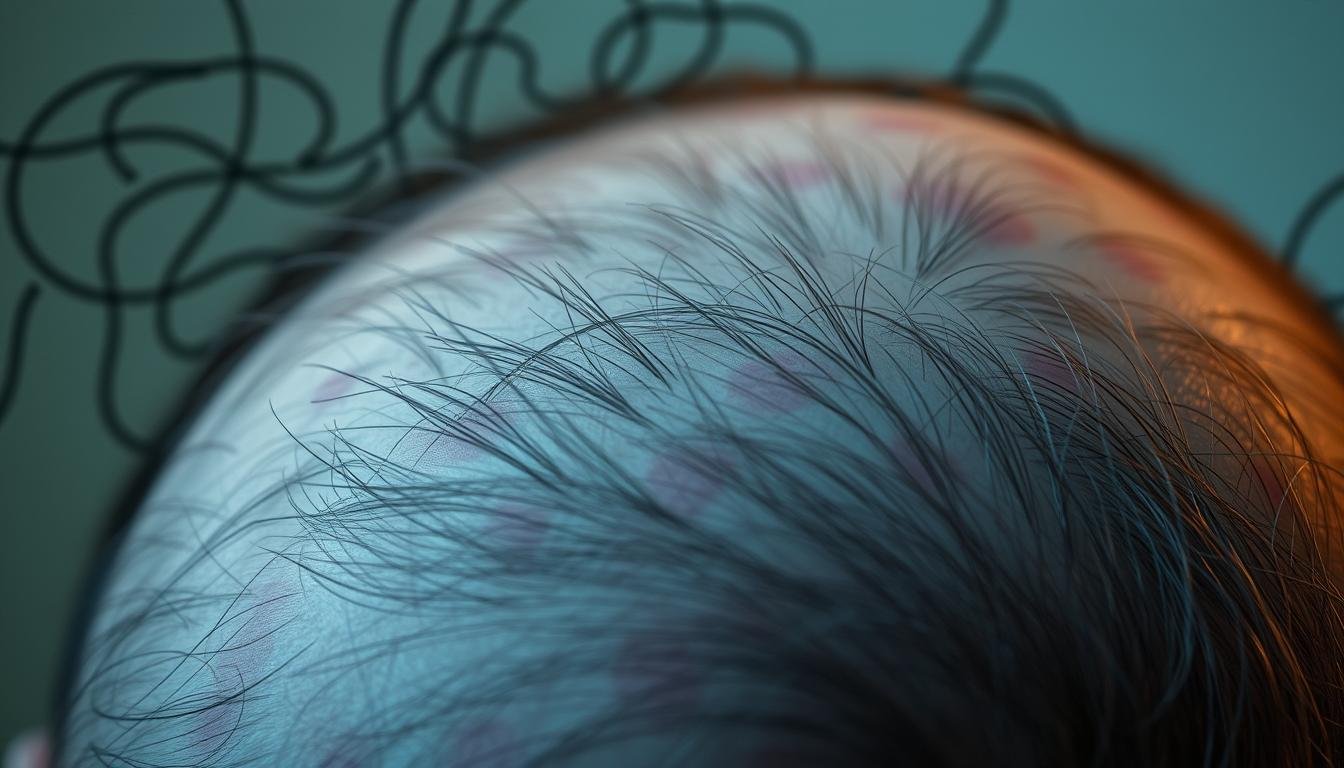Does Stress Cause Hair Loss? Understanding the Connection
Did you know that over 80 million Americans struggle with hair loss, making it one of the most common medical conditions in the country? While the thought of permanent Balding can be daunting, the latest research suggests that in many cases, hair can indeed regrow after thinning or falling out.
In this comprehensive article, we’ll dive into the science behind Hair Loss, exploring the various factors that contribute to Balding, and uncover the latest advancements in hair regrowth treatments. Whether you’re dealing with stress-related Hair Loss or hereditary factors, understanding the hair growth cycle and the potential for regrowth can provide hope and guidance on your journey to thicker, healthier hair.
Key Takeaways
- Hair loss affects over 80 million Americans, making it a widespread issue.
- Research suggests that in many cases, hair can regrow after thinning or falling out.
- Factors such as stress, genetics, and medical conditions can contribute to hair loss.
- Understanding the hair growth cycle is crucial in determining the potential for regrowth.
- A range of treatments, from over-the-counter solutions to medical procedures, can help promote hair regrowth.
Understanding Hair Loss: Types and Causes
Hair loss can be a frustrating and distressing experience, affecting individuals of all ages and genders. To better understand this common issue, it’s essential to explore the various types of hair loss and their underlying causes.
Androgenetic Alopecia: The Most Common Cause
One of the most prevalent forms of hair loss is androgenetic Alopecia, also known as male or female pattern baldness. This genetic condition is characterized by a gradual thinning of hair, often starting at the temples or crown of the head. It is believed to be caused by a sensitivity to certain hormones called androgens, which can lead to the miniaturization of hair follicles.
Telogen Effluvium: Temporary Hair Loss Explained
Telogen effluvium is a type of stress-related alopecia that can cause temporary shedding of hair. This condition is often triggered by significant life events, such as major surgery, severe illness, emotional stress, or even changes in medication. During this process, a larger number of hair follicles enter the resting (telogen) phase, leading to increased hair fall.
Other Factors Contributing to Hair Loss
While androgenetic Alopecia and telogen effluvium are two of the most common causes of hair loss, there are several other factors that can contribute to this condition, including:
- Autoimmune disorders, such as alopecia areata, which cause patchy hair loss
- Nutritional deficiencies, particularly in proteins, vitamins, and minerals
- Certain medications, such as chemotherapy drugs or antidepressants
- Underlying medical conditions, like thyroid disorders or anemia
- Mechanical stress on the hair, such as tight hairstyles or excessive styling
Understanding the different types and causes of hair loss is the first step towards finding effective solutions and regaining confidence in one’s appearance.
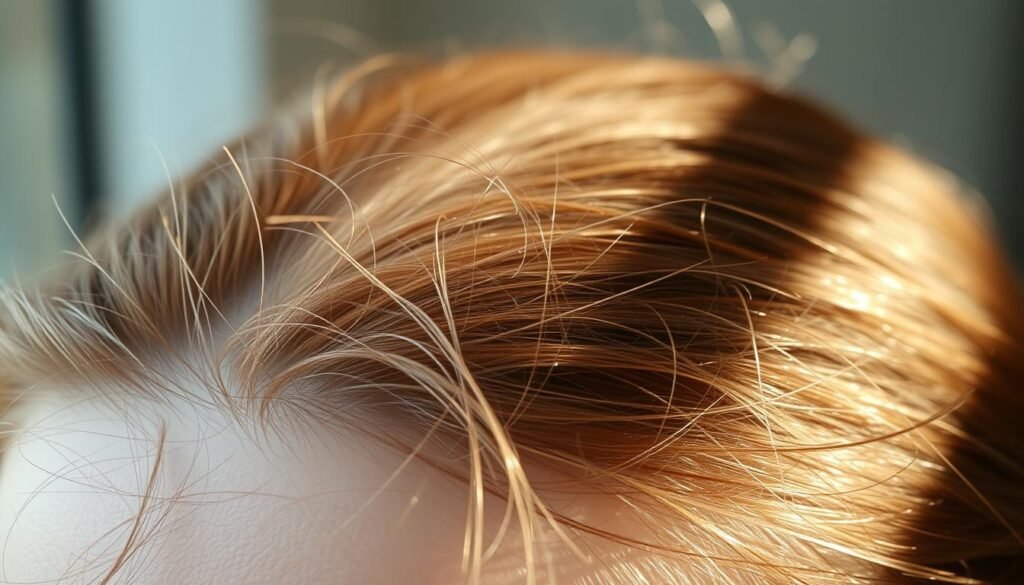
The Hair Growth Cycle: A Brief Overview
To understand the potential for hair regrowth, it’s crucial to grasp the complexities of the hair growth cycle. This natural cycle consists of three distinct phases, each playing a crucial role in the life of a single hair strand.
Anagen Phase: The Growth Phase
The anagen phase is the active growth stage of the hair cycle. During this phase, which can last for years, hair follicles are continuously producing new hair strands. This is the longest phase, and it’s where healthy, vibrant hair is produced.
Catagen Phase: The Transition Phase
The catagen phase is a brief, transitional stage that lasts for a few weeks. In this phase, the hair follicle shrinks, and the hair strand separates from the blood supply, preparing to enter the resting phase.
Telogen Phase: The Resting Phase
The telogen phase is the resting stage, where the hair follicle remains dormant for several months. During this phase, the old hair strand is released, and the cycle begins anew with the growth of a new hair.
Stress, particularly elevated levels of the hormone cortisol, can disrupt this delicate cycle, leading to temporary shedding or cortisol and hair loss. Understanding the various stages of the hair growth cycle is essential for identifying the underlying causes of hair loss and exploring potential solutions for hair regrowth.
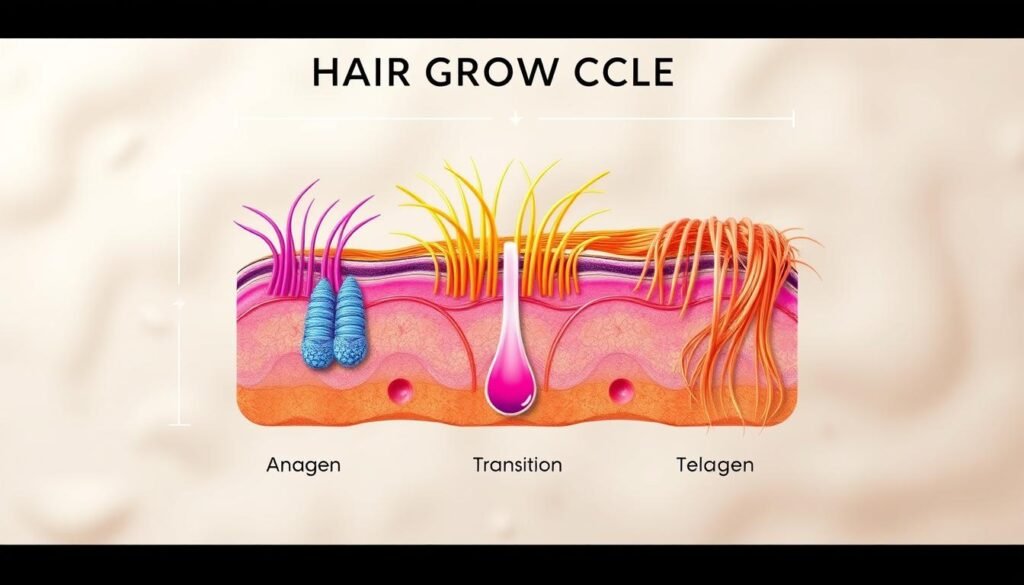
“The hair growth cycle is a complex and fascinating process, and understanding its intricacies can unlock the key to healthier, more vibrant hair.”
Can Hair Regrow After Balding?
For those experiencing stress-induced hair loss, the prospect of regrowth is often a pressing concern. The good news is that in many cases, hair can indeed regrow after periods of excessive shedding or balding. However, the ability to regain a full head of hair depends on a variety of factors.
Factors That Influence Hair Regrowth
The potential for hair regrowth is influenced by the underlying cause of the hair loss. In cases of chronic stress or telogen effluvium, the hair follicles are typically still intact and capable of producing new hair. Other factors that can impact hair regrowth include:
- Addressing the root cause of the hair loss, such as managing stress levels or treating an underlying medical condition
- Adopting a healthy, balanced diet rich in nutrients essential for hair growth
- Incorporating hair-friendly supplements, such as biotin, iron, or zinc
- Utilizing topical treatments like minoxidil or engaging in therapies like platelet-rich plasma (PRP)
Timeframe: How Long Does It Take?
The timeline for hair regrowth can vary significantly from person to person. In cases of stress-related hair loss, it’s not uncommon for new hair to start emerging within 3-6 months, provided that the underlying trigger has been addressed. However, it can take up to 12-18 months for the hair to fully regrow and achieve a healthy, fuller appearance.
Myths Surrounding Hair Regrowth
Unfortunately, there are many misconceptions surrounding hair regrowth, especially when it comes to the impact of stress on hair loss. It’s important to separate fact from fiction and understand that with the right approach, hair can indeed regrow after periods of excessive shedding or balding.
| Myth | Fact |
|---|---|
| Stress causes permanent hair loss | While stress can contribute to temporary hair loss, it does not typically lead to permanent baldness. |
| Hair can’t regrow after stress-induced shedding | In many cases, hair can regrow after the underlying trigger, such as stress, is addressed. |
| Hair loss is a natural part of aging | While some hair loss is normal with age, excessive shedding or Balding may be a sign of an underlying issue. |
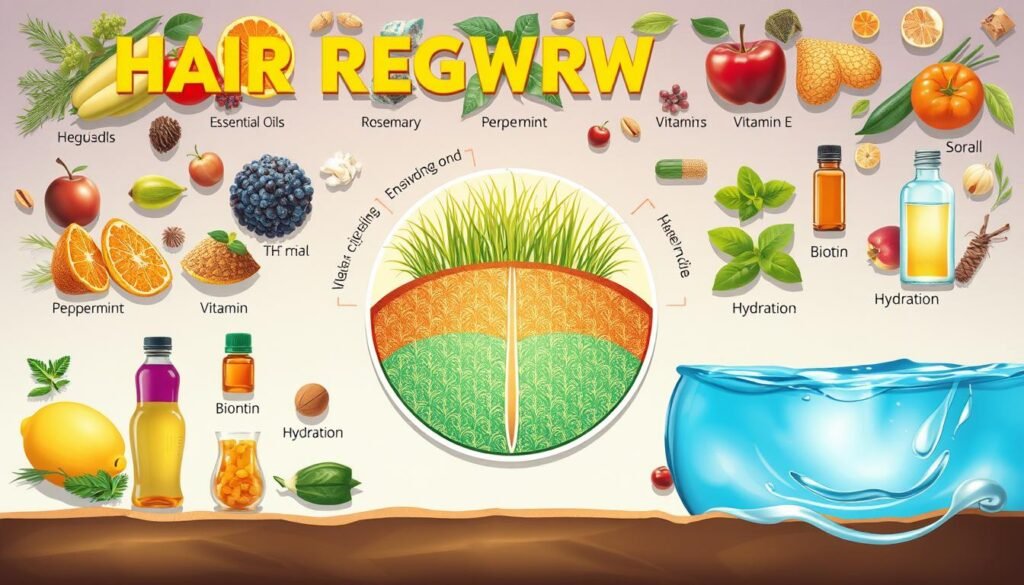
By understanding the factors that influence hair regrowth and addressing the root causes of hair loss, many individuals can look forward to a healthy, fuller head of hair in the months and years to come.
Treatments for Hair Loss: What Works?
Dealing with hair loss can be a frustrating and overwhelming experience, but there are several effective treatments available that can help. From over-the-counter solutions to prescription medications and natural remedies, understanding the options is key to finding the right approach for managing stress-related hair health.
Minoxidil: Over-the-Counter Solutions
Minoxidil, commonly known by the brand name Rogaine, is one of the most well-known over-the-counter treatments for hair loss. This topical solution works by stimulating hair follicles and promoting new growth. It’s available in both liquid and foam formulations and has been shown to be effective in treating certain types of hair loss, including androgenetic Alopecia and telogen effluvium.
Finasteride: Prescription Medications
For more severe cases of hair loss, prescription medications like finasteride may be recommended. Finasteride, marketed as Propecia, is a DHT-blocking drug that can help slow down or even reverse the effects of male pattern baldness. While prescription medications can be more effective than over-the-counter options, they often require a doctor’s supervision and may come with potential side effects.
Herbal and Natural Remedies
- Saw Palmetto: This herb is believed to have anti-androgen properties that may help reduce hair loss by blocking the conversion of testosterone to DHT.
- Pumpkin Seed Oil: Rich in essential fatty acids and nutrients, pumpkin seed oil has been studied for its potential to stimulate hair growth and prevent further loss.
- Rosemary Oil: Known for its ability to improve circulation, rosemary oil has been used as a natural remedy for managing stress-related hair loss.
While these natural treatments may be worth exploring, it’s important to consult with a healthcare professional before trying any new supplements or remedies, as they may interact with existing medications or have other potential side effects.

Regardless of the treatment approach, managing stress and maintaining a healthy lifestyle are crucial factors in supporting hair growth and preventing further loss. By addressing the underlying causes of hair loss and incorporating a comprehensive strategy, individuals can take proactive steps towards regaining their hair health.
Hair Restoration Procedures: An Option?
For individuals experiencing severe stress-related alopecia or psychological factors contributing to hair loss, advanced hair restoration procedures may offer a path to regaining a full head of hair. These innovative treatments go beyond traditional hair growth remedies, providing more comprehensive solutions for those struggling with stubborn hair loss.
Hair Transplant Surgery
Hair transplant surgery has emerged as a popular option for individuals seeking a permanent solution to their hair loss. This procedure involves harvesting healthy hair follicles from areas of the scalp with abundant growth and transplanting them to the balding or thinning regions. The transplanted follicles take root and continue to grow, eventually restoring a natural-looking, full head of hair. However, it’s essential to consult with a qualified hair restoration specialist to determine if this procedure is the right choice for your specific needs and to understand the potential risks and recovery timeline.
Scalp Micropigmentation
For those who may not be suitable candidates for hair transplant surgery or prefer a non-invasive approach, scalp micropigmentation offers an alternative solution. This innovative technique involves the application of pigment to the scalp, creating the illusion of closely shaved hair follicles. The result is a natural-looking, closely cropped hairstyle that can effectively camouflage the appearance of thinning or balding areas. Scalp micropigmentation is a relatively quick and painless procedure, making it a popular choice for individuals seeking a low-maintenance solution to their stress-related alopecia.
Platelet-Rich Plasma (PRP) Therapy
Platelet-Rich Plasma (PRP) therapy is a non-surgical treatment that harnesses the power of the body’s own growth factors to stimulate hair regrowth. This procedure involves extracting a sample of the patient’s blood, separating the platelets, and then injecting the concentrated platelet-rich plasma back into the scalp. The growth factors in the platelets are believed to promote the activation and proliferation of dormant hair follicles, leading to the restoration of hair growth. PRP therapy is often used in conjunction with other hair loss treatments, providing a more holistic approach to addressing stress-related alopecia and psychological factors contributing to hair loss.
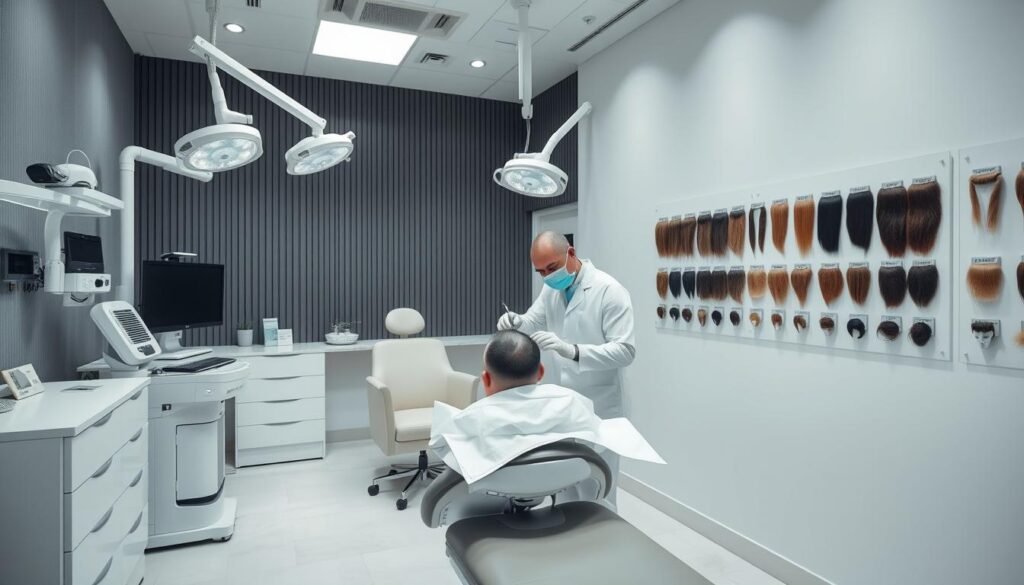
While these advanced hair restoration procedures offer hope for those struggling with severe hair loss, it’s crucial to consult with a dermatologist or hair loss specialist to determine the most appropriate course of action. Factors such as the underlying cause of the hair loss, the extent of the problem, and the individual’s overall health and goals will all play a role in determining the most suitable treatment approach.
Lifestyle Changes to Support Hair Growth
Maintaining healthy hair growth goes beyond topical treatments; it requires a holistic approach that addresses various lifestyle factors. From optimizing your diet to managing stress and prioritizing sleep, these strategies can help promote lustrous locks and combat the effects of cortisol-induced hair loss.
Nutrition and Diet for Healthy Hair
Your hair is a reflection of the nutrients you consume. To support hair growth, focus on a balanced diet rich in:
- Proteins, such as lean meats, eggs, and legumes, which provide the building blocks for healthy hair
- Vitamins and minerals, including biotin, iron, and zinc, which are essential for hair follicle health
- Healthy fats, like those found in avocados, nuts, and olive oil, to nourish the scalp and hair strands
Stress Management Techniques
Chronic stress can take a toll on your hair, as elevated cortisol levels can disrupt the hair growth cycle and lead to increased shedding. Incorporating stress-management practices, such as meditation, yoga, or deep breathing exercises, can help mitigate the negative effects of stress on your hair health.
Importance of Sleep in Hair Health
Quality sleep plays a crucial role in maintaining healthy hair. During sleep, your body undergoes essential restorative processes, including the regulation of hormones that influence hair growth. Aim for 7-9 hours of sleep each night to support your hair’s natural growth cycle and reduce the impact of cortisol and hair loss.
| Lifestyle Factor | Impact on Hair Health | Recommended Practices |
|---|---|---|
| Nutrition and Diet | Provides essential nutrients for hair growth and structure |
|
| Stress Management | Helps regulate cortisol levels and minimize stress-induced hair loss |
|
| Sleep Quality | Supports the hair growth cycle and hormonal balance |
|

“Stress and lack of sleep can have a significant impact on hair health, leading to increased shedding and slowed growth. By addressing these lifestyle factors, you can support your hair’s natural resilience and vitality.”
Dealing with Hair Loss Emotionally
Experiencing hair loss can be a challenging and emotional journey for many individuals. The psychological factors in hair loss, such as stress-related alopecia, can have a significant impact on one’s self-image and confidence. It’s important to recognize and address the emotional aspects of this condition to support the overall well-being of those affected.
Coping Strategies for Affected Individuals
Developing effective coping strategies is crucial when dealing with stress-related hair loss. Some recommended approaches include:
- Practicing mindfulness and relaxation techniques, such as meditation or deep breathing exercises, to manage stress and anxiety.
- Engaging in regular physical activity, which can help alleviate the psychological factors in hair loss and improve overall well-being.
- Seeking support from friends, family, or online communities to share experiences and find emotional validation.
Support Groups and Counseling Options
Connecting with others who are experiencing similar challenges can provide a sense of community and understanding. Joining support groups, both in-person and online, can be a valuable resource for those dealing with the emotional impact of hair loss. Additionally, seeking professional counseling or therapy can help individuals develop coping strategies and address any underlying mental health concerns related to stress-related alopecia.
The Role of Self-Image and Confidence
Hair loss can significantly impact an individual’s self-image and confidence. It’s important to acknowledge and address these feelings, as they can have a ripple effect on various aspects of life. Embracing one’s natural appearance, exploring alternative hairstyles or accessories, and focusing on overall self-care can help rebuild confidence and strengthen self-image during this challenging time.
Addressing the emotional aspects of hair loss is crucial for overall well-being and can ultimately support the journey towards hair regrowth and personal empowerment.

Current Research on Hair Regrowth
In the realm of hair regrowth, researchers are continuously exploring groundbreaking innovations and advancements. From novel treatments to cutting-edge stem cell research, the future of hair loss solutions holds great promise for those affected by stress-induced telogen effluvium and other forms of Does stress cause hair loss?
Innovations in Hair Loss Treatments
One of the most exciting areas of research in hair regrowth is the development of innovative treatments. Scientists are exploring a variety of approaches, including:
- Topical formulations that target the root causes of hair loss
- Advanced laser therapies to stimulate follicular activity
- Combination therapies that synergistically address multiple factors
Stem Cell Research and Its Potential
Stem cell research has emerged as a promising avenue for hair regrowth solutions. Researchers are investigating the use of stem cells to regenerate damaged or dormant hair follicles, offering the possibility of restoring natural hair growth in individuals affected by Does stress cause hair loss? and telogen effluvium.
| Stem Cell-Based Treatments | Potential Benefits |
|---|---|
| Follicular Unit Extraction (FUE) | Harvesting and transplanting stem cell-rich follicular units |
| Injections of Stem Cell-Derived Factors | Stimulating dormant follicles and promoting regrowth |
The Future of Hair Regrowth Solutions
As research continues to evolve, the future of hair regrowth solutions holds exciting prospects. Experts anticipate advancements in personalized therapies, gene-based treatments, and even the potential for hair follicle regeneration using cutting-edge biotechnology.
“The field of hair regrowth is rapidly advancing, and we’re on the cusp of transformative breakthroughs that could revolutionize the way we approach hair loss.”
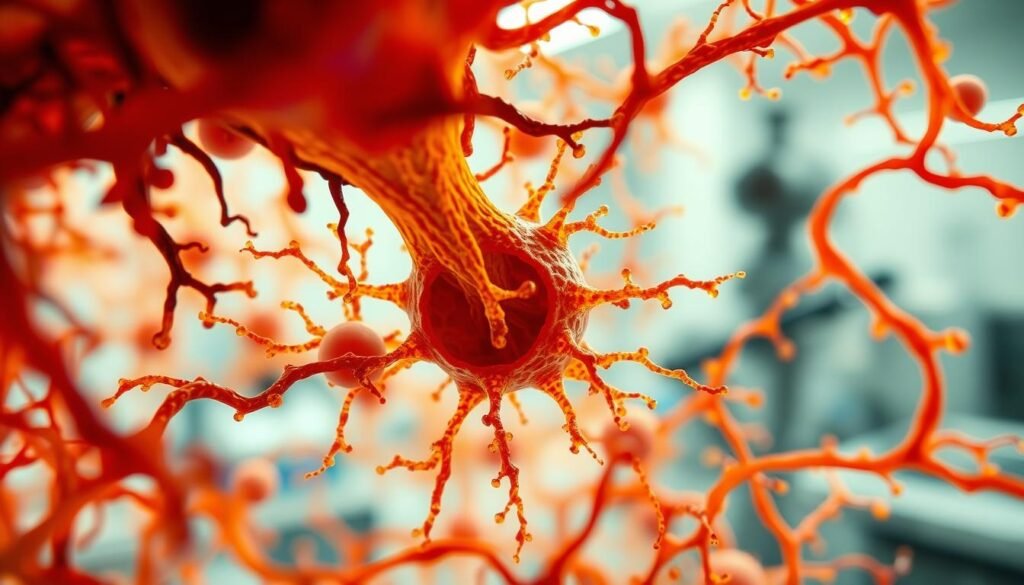
Conclusion: What You Need to Know About Stress and Hair Loss
Throughout this article, we’ve explored the complex relationship between stress and hair loss, uncovering the ways in which chronic stress can impact the health and growth of our hair. As we conclude our discussion, it’s important to remember that while stress can be a significant factor in hair loss, there are steps you can take to manage it and support your hair’s resilience.
Summary of Key Points
In summary, we’ve learned that stress can contribute to various forms of hair loss, including telogen effluvium and increased shedding. By understanding the mechanisms behind stress-related hair loss, you can take proactive measures to address the underlying causes and support healthier hair growth. Maintaining a balanced lifestyle, practicing stress-management techniques, and seeking medical advice when necessary are all crucial for mitigating the impact of stress on your hair.
Encouragement for Those Experiencing Hair Loss
If you’re currently experiencing hair loss, know that you’re not alone. Hair loss can be a deeply personal and emotional experience, but with the right approach and support, it is possible to regain your hair’s vitality. Stay positive, focus on self-care, and don’t hesitate to seek the guidance of a trusted healthcare professional or join a supportive community. Remember, hair loss is often a treatable condition, and with the right strategies, you can take control of your hair’s health and appearance.
Seeking Professional Help: When to Consult a Specialist
While self-care and lifestyle adjustments are essential, there may be times when seeking the expertise of a dermatologist or hair loss specialist is necessary. If you’re experiencing persistent or severe hair loss, or if you’re unsure of the underlying cause, it’s recommended to consult a professional. They can provide a thorough evaluation, diagnose the specific type of hair loss, and develop a personalized treatment plan to address your unique needs. By working closely with a specialist, you can ensure that you’re taking the right steps to manage stress and promote healthy hair growth.
FAQ
Does stress cause hair loss?
Yes, stress can be a significant contributing factor to hair loss. A condition called telogen effluvium, which is a type of temporary hair shedding, can be triggered by high levels of stress or a traumatic event. Prolonged or chronic stress can disrupt the normal hair growth cycle, leading to increased hair fall.
How does cortisol affect hair loss?
Cortisol, the primary stress hormone, plays a crucial role in stress-related hair loss. High levels of cortisol can interfere with the hair growth cycle, pushing more hair follicles into the telogen (resting) phase, leading to excessive shedding or thinning of hair.
What is telogen effluvium?
Telogen effluvium is a temporary form of hair loss that can be triggered by various factors, including stress. It occurs when a significant number of hair follicles are pushed into the telogen (resting) phase prematurely, causing increased shedding and thinning of hair.
Can stress-related alopecia be reversed?
Yes, in many cases, stress-related hair loss can be reversed once the underlying stressor is addressed, and the body’s natural hair growth cycle is restored. However, the timeframe for regrowth can vary, and it may take several months for the hair to fully recover.
What are the psychological factors involved in hair loss?
Hair loss, whether caused by stress or other factors, can have a significant psychological impact on individuals. Feelings of self-consciousness, low self-esteem, and anxiety are common among those experiencing hair loss. Addressing the emotional and mental aspects of hair loss is essential for overall well-being.
Is temporary shedding normal after a stressful event?
Yes, it is quite common to experience temporary shedding or increased hair loss after a significant stressful event or a period of high stress. This is known as telogen effluvium and is the body’s natural response to the physiological changes triggered by stress.
How does chronic stress impact hair health?
Chronic or prolonged stress can have a detrimental effect on hair health. The sustained high levels of cortisol can disrupt the normal hair growth cycle, leading to a higher percentage of hair follicles entering the telogen phase prematurely. This can result in persistent hair thinning, shedding, and an overall reduction in hair density.
What can I do to manage stress and promote hair growth?
Implementing stress management techniques, such as regular exercise, meditation, and relaxation practices, can help mitigate the negative impact of stress on hair health. Additionally, maintaining a balanced diet, ensuring adequate sleep, and seeking professional support when needed can all contribute to managing stress and promoting healthy hair growth.
